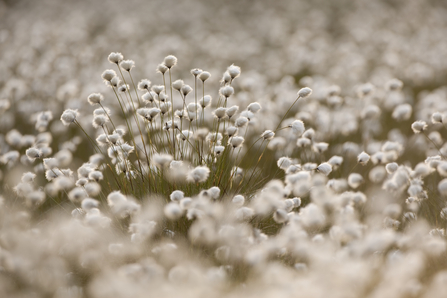
Cotton grass - commonly found on peat bogs. Image by Peter Cairns 2020VISION.

Cotton grass - commonly found on peat bogs. Image by Peter Cairns 2020VISION.
The opportunity to pass legislation comes via the new Horticultural Peat Private Members Bill being debated in the House of Commons on Tuesday 16th April, proposed by former Environment secretary Theresa Villiers.
The campaign to stop peat extraction took off in the 1990s and legislation to ban peat sales has been pondered by the UK Government for over a decade.
Two years ago, it promised a ban by the end of this Parliament in 2024. However, sales of peat compost and peat-containing products remains legal in the UK, contributing to the destruction of peatland habitats here and across Europe.
Ninety-five percent of people that responded to the UK Government’s consultation - of which 88% were amateur gardeners - were in favour of a complete retail sales ban.
Alison Steadman, actor, and ambassador for The Wildlife Trusts, says:
“The Government is running out of time to fulfil its promise to ban the sale of peat to gardeners by the end of this parliament. Peat belongs in bogs not bags and its high time that commitments to ensure a ban are honoured. What’s left of precious peatlands needs protecting and restoring, not despoiling. Whenever a peatland is dug up a natural habitat is destroyed with appalling consequences for wildlife and our climate. Let’s get on with the ban and not kick the can down the road any longer.”
Cel Spellman, actor and ambassador for The Wildlife Trusts, says:
“We can all learn how to grow beautiful plants and our own food without using peat. There is already lots of insightful advice out there to help, including a free guide on going peat-free by The Wildlife Trusts. Our compost heap is a cornerstone on mine and my friend’s allotment. It’s easy to create nutrient-rich soils and compost without ever needing peat.
“Ending the sale of peat products would be a huge step forward and a much needed one too - I hope the UK Government picks up its heels on this issue that has simply dragged on for far too long, especially after already going back on so many other promises and commitments.”
Duncan Hutt, Northumberland Wildlife Trust Director of Conservation says:
“Peatlands have the power to help lock up carbon, alleviate flooding, help wildlife recover and are central to our ability to address the climate crises.
“When in a healthy state, peatlands, such as the Border Mires in Northumberland, lock up and store carbon for millennia.
However, decades of human interventions have transformed peatlands into carbon sources; emissions from degraded peatlands now account for 4% of the UK’s total annual greenhouse gas emissions. It must stop!"
The Office for Environmental Protection, the government’s environment watchdog, recently warned that UK Government remains ‘largely off track to meet its environmental ambitions’ and its advisors have cautioned that progress in reducing emissions is stalling because policy development is too slow. This is perfectly exemplified by the policy failure to ban peat sales.
In 2022, The Wildlife Trusts published analysis that revealed the policy failures to stop peat extraction has caused up to thirty-one million tonnes of CO2 to be released since 1990. That is equivalent in emissions terms to fifteen million return flights from London to New York or the annual emissions produced by over seven million cars.
Peatlands provide vital habitat for a variety of plant and animal species, many of which are specifically adapted to the waterlogged and acidic conditions peatlands provide. With 1 in 6 species now at risk of extinction in Great Britain, an immediate ban on the destruction of peatlands for gardening and growing would make important progress towards reversing these catastrophic declines.